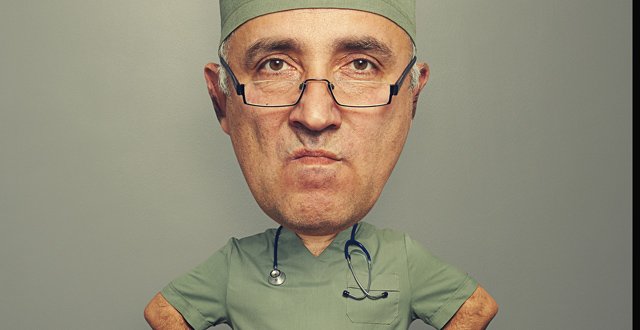
funny picture of bighead angry doctor in glasses over dark background
Dr Christine O’Malley says the most important factor in choosing a consultant is how good they are at their job, even if their personality might rub patients up the wrong way
“Please choose a consultant for me.”
My ophthalmologist said I needed to see a
retinal surgeon about my complex eye problems. She named specialists across the
country, and asked who I wanted to see.
I had no idea how to decide. This time I
was the patient, not the doctor, and I didn’t want to choose. So she referred
me, and I was very happy with her choice.
Many years ago, my sister decided to have
sight-correcting surgery. A friend highly recommended his eye specialist. He had
worn bottle-end glasses all his life, and the outcome of his surgery was
impressive. But a male engineer (without children) probably has different
expectations of a doctor.
Accompanied by her small daughter, my
sister sat nervously in the waiting-room. On the door of the great man’s
consultation room was a sign: ‘Unruly children will be sold into slavery.’ My
sister was not amused. Then the patient before her (a woman) emerged, saying
“that is the rudest man I’ve ever met!”
The unfortunate receptionist was most
apologetic and tried to ease the situation by talking about his great skill as
a surgeon.
Then it was my sister’s turn. Usually very
mild-mannered, she gave out to the consultant about his waiting-room sign. They
had a row. Then he examined her eyes, and said she did not need corrective
surgery. She needed surgery for undiagnosed cataracts.
It can be quite difficult to believe a
consultant after you’ve had a fight. They nearly had a row in the operating
theatre, too. But he is a very able surgeon and did a good job.
I remember when my mother had a
life-threatening cancer of her thigh and I accompanied her to see the surgeon
and radiotherapist. A GP friend surmised that my mother would like the
radiotherapist, known to be very friendly, but would find the surgeon arrogant
and ‘godlike’. I knew both men since student days, and probably would have
guessed the same.
We were wrong. My
mother found the friendly man patronising.
She really liked the
surgeon. I was there when, after much deliberation, he outlined his
conclusions. He did not have to recommend a horrific amputation. He could
completely remove the tumour, perform curative surgery, and she would still be
able to walk. But, he added, she might need to use a stick.
I was overwhelmed
with relief. Up to this, amputation had seemed the only possibility.
My mother said
nothing. He looked at her: “I can see you don’t like the idea of a stick. I’m
hoping you won’t need it, but I have to warn you, just in case.”
I’m a geriatrician.
My mother was 75. I was shocked and confused by her reaction, but her surgeon
wasn’t.
The operation went
well and she didn’t need a stick. The following years were good: Among other
fun times, my mother navigated a boat (for the first time) through all the
locks on the Shannon-Erne river system. She nearly got to the Grand Prix in
Barcelona, but her cancer returned.
It was her final
illness. Her surgeon said to me: “Maybe I was wrong. Maybe I should have
amputated after all.” “No”, I said. “She had three great years. You were
right.”
Even the ‘gods’ have
moments of self-doubt.
At a party, a friend
was talking about his daughter’s experience as a graduate medical student. She
was giving out about consultants, especially some of the more arrogant, ‘godlike’ surgeons.
Like the receptionist,
usually I would be somewhat apologetic, but talk about their abilities. Not
this time. I told him some truths.
It takes all types;
different patients like different doctors. We’re not always the best at
deciding for ourselves which doctor suits us.
A surgeon’s primary
role is to make decisions and to operate. Or to make the equally difficult
decision not to operate.
Skill as a doctor
does not always travel with the most amenable personality. It’s nice to like
your consultant, but personality is secondary.
And who knows what the right personality is?





Leave a Reply
You must be logged in to post a comment.